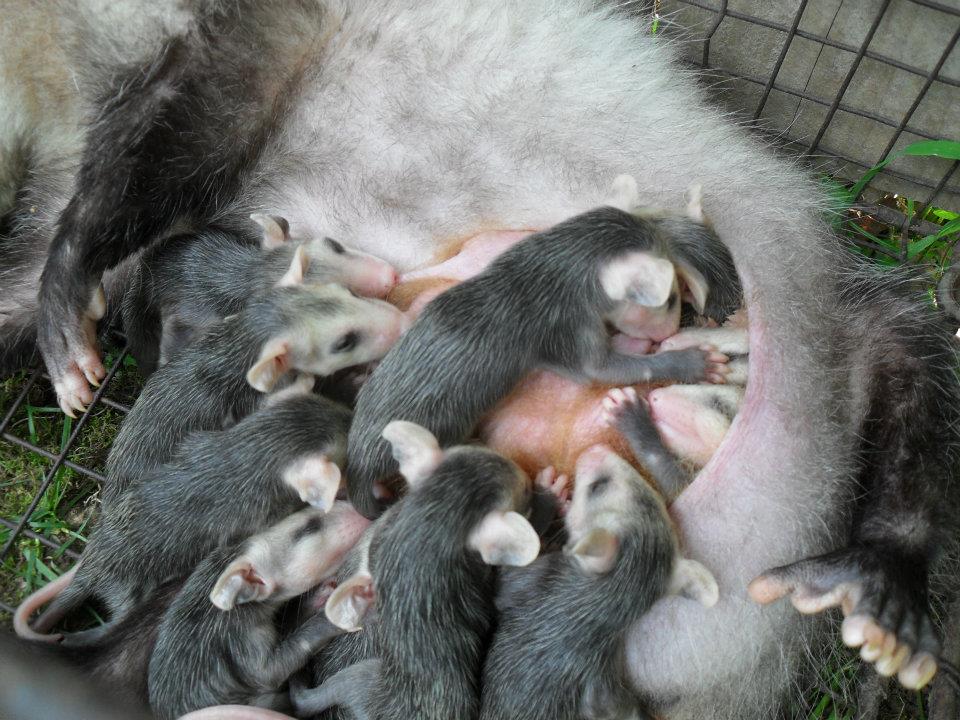Fast, effective wildlife removal in Columbia, MO
Opossums pose little direct danger to people, but they can cause problems when they get inside attics, crawlspaces, or under decks. They’ll destroy insulation and dig under structures. Opossums can also carry diseases that can spread to people.
Signs of Opossums

Like many other nuisance pests that are skilled climbers, it is not uncommon to find an opossum in the attic. Some common signs include:
- Scratching, scampering, and rustling sounds coming from the attic, especially at night when they are awake and active. Strange noises in the attic also include their vocalizations, such as grunts, hisses, clicking, and screeches.
- A distinctively musky smell that comes from their scent glands, which they use to mark their territory, and the foul smell of feces and urine.
- An opossum nest in your attic is made of leaves, grass, paper, and other debris in the corner, along rafters, or other secluded areas of the attic.
- Cylindrical opossum droppings that are about one to two inches in length, smooth on the sides, and curled on the ends. Older feces can be covered in a white or yellowish mold.
- Torn insulation and gnawed wood and wires.
It can be hard to tell if the critter in your attic is a raccoon or an opossum. Raccoons make more chattering noises, and their poop looks similar to dog poop.
Problems Caused by Opossums
No homeowners want to share their attic with opossums for safety, health, and property damage reasons. An opossum’s menacing, rat-like presence is not only frightening upon discovery, but chances are, they’ve got young (called joeys) either within their pouch or in their nest.
- Hearing them all night as they move about and vocalize can cause a disturbing and disruptive lack of rest.
- Opossums are vectors for parasites, including ticks, lice, fleas, and mites. They also carry internal parasites such as roundworms and tapeworms, which can infect humans and pets through feces.
- When they feel threatened or cornered, the dangers of opossums becoming aggressive, biting, or scratching to defend themselves are heightened.
- While contracting rabies is not a danger as they rarely carry the disease, opossums can spread leptospirosis, e-coli, and salmonellosis.
Opossum Repellents and Other DIY Removal Options
There are over-the-counter products that claim positive results but rarely work effectively. These products include ultrasonic pest repellers, sachets with scents such as peppermint that are unpleasant to opossums, predator urine, motion-activated lights and sounds, and more. These products have limited results as opossums become used to these tactics and are smart enough to realize they don’t pose a danger to them.
Trapping and relocating opossums on one’s own is not only unsafe but illegal in most states. In addition, it is not humane as the health and survival of relocated opossums is greatly reduced.
Professional Opossum Removal Services
A professional wildlife removal company has the experience and expertise to quickly, effectively, and humanely eliminate opossums from an attic. It eliminates the risk of being injured by an animal that has become aggressive when cornered or contracting an illness or parasite from being in the presence of its feces and urine.
One of the best benefits of hiring a wildlife removal company such as Critter Control is that you can set up a free inspection first and will be presented with a custom plan for eliminating the opossums and excluding them from returning. And, Critter Control will restore your attic to its original state by conducting repairs and cleaning and sanitizing.
